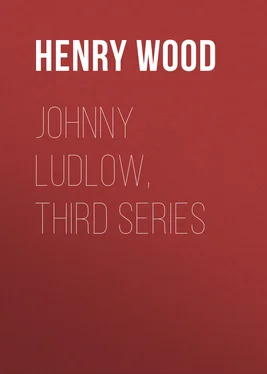Henry Wood - Johnny Ludlow, Third Series
Здесь есть возможность читать онлайн «Henry Wood - Johnny Ludlow, Third Series» — ознакомительный отрывок электронной книги совершенно бесплатно, а после прочтения отрывка купить полную версию. В некоторых случаях можно слушать аудио, скачать через торрент в формате fb2 и присутствует краткое содержание. Жанр: foreign_prose, literature_19, foreign_antique, на английском языке. Описание произведения, (предисловие) а так же отзывы посетителей доступны на портале библиотеки ЛибКат.
- Название:Johnny Ludlow, Third Series
- Автор:
- Жанр:
- Год:неизвестен
- ISBN:нет данных
- Рейтинг книги:4 / 5. Голосов: 1
-
Избранное:Добавить в избранное
- Отзывы:
-
Ваша оценка:
- 80
- 1
- 2
- 3
- 4
- 5
Johnny Ludlow, Third Series: краткое содержание, описание и аннотация
Предлагаем к чтению аннотацию, описание, краткое содержание или предисловие (зависит от того, что написал сам автор книги «Johnny Ludlow, Third Series»). Если вы не нашли необходимую информацию о книге — напишите в комментариях, мы постараемся отыскать её.
Johnny Ludlow, Third Series — читать онлайн ознакомительный отрывок
Ниже представлен текст книги, разбитый по страницам. Система сохранения места последней прочитанной страницы, позволяет с удобством читать онлайн бесплатно книгу «Johnny Ludlow, Third Series», без необходимости каждый раз заново искать на чём Вы остановились. Поставьте закладку, и сможете в любой момент перейти на страницу, на которой закончили чтение.
Интервал:
Закладка:
It appeared nearly certain now, to us, that he had gone with Alfred Arne, and, after a private consultation with Mrs. Todhetley, Tod and I set out in search of the man. She still wished to spare the knowledge of his visit to the Squire, if possible.
We had not far to go. Mrs. Todhetley’s fears went ranging abroad to London, or Liverpool, or the Coral Islands beyond the sea, of which Arne had talked to Hugh: but Arne was found at Timberdale. In an obscure lodging in the further outskirts of the place, the landlord of which, a man named Cookum, was a bad character, and very shy of the police, Arne was found. We might have searched for him to the month’s end, but for Luke Mackintosh. When Luke arrived at Timberdale in the middle of the night, ordered there by Tod to make inquiries at the police-station, he saw a tipsy man slink into Cookum’s house, and recognized him for the one who had recently been exciting speculation at home. Luke happened to mention this to Tod, not connecting Hugh with it at all, simply as a bit of gossip: of course it was not known who Arne was, or his name, or what he had been waiting for.
We had a fight to get in. Cookum came leaping down the crazy stairs, and put himself in our way in the passage, swearing we should not go on. Tod lifted his strong arm.
“I mean to go on, Cookum,” he said, in a slow, quiet voice that had determination in every tone of it. “I have come to see a man named Arne. I don’t want to do him any ill, or you either; but, see him, I will. If you do not move out of my way I’ll knock you down.”
Cookum stood his ground. He was short, slight, and sickly, with a puffy face and red hair; a very reed beside Tod.
“There ain’t no man here of that name. There ain’t no man here at all.”
“Very well. Then you can’t object to letting me see that there is not.”
“I swear that you shan’t see, master. There!”
Tod flung him aside. Cookum, something like an eel, slipped under Tod’s arm, and was in front of him again.
“I don’t care to damage you, Cookum, as you must see I could do, and force my way in over your disabled body; you look too weak for it. But I’ll either go in so , or the police shall clear an entrance for me.”
The mention of the police scared the man; I saw it in his face. Tod kept pushing on and the man backing, just a little.
“I won’t have no police here. What is it you want?”
“I have told you once. A man named Arne.”
“I swear then that I never knowed a man o’ that name; let alone having him in my place.”
And he spoke with such passionate fervour that it struck me Arne did not go by his own name: which was more than probable. They were past the stairs now, and Cookum did not seem to care to guard them. The nasty passage, long and narrow, had a door at the end. Tod thought that must be the fortress.
“You are a great fool, Cookum. I’ve told you that I mean no harm to you or to any one in the place; so to make this fuss is needless. You may have a band of felons concealed here, or a cart-load of stolen goods; they are all safe for me. But if you force me to bring in the police it might be a different matter.”
Perhaps the argument told on the man; perhaps the tone of reason it was spoken in; but he certainly seemed to hesitate.
“You can’t prove that to me, sir: not that there’s any felons or things in here. Show me that you don’t mean harm, and you shall go on.”
“Have you a stolen child here?”
Cookum’s mouth opened with genuine surprise. “A stolen child!”
“We have lost a little boy. I have reason to think that a man who was seen to enter this passage in the middle of the night knows something of him, and I have come to ask and see. Now you know all. Let me go on.”
The relief on the man’s face was great. “Honour bright, sir.”
“Don’t stand quibbling, man,” roared Tod passionately. “Yes!”
“I’ve got but one man in all the place. He have no boy with him, he haven’t.”
“But he may know something of one. What’s his name?”
“All the name he’ve given me is Jack.”
“I dare say it’s the same. Come! you are wasting time.”
But Cookum, doubtful still, never moved. They were close to the door now, and he had his back against it. Tod turned his head.
“Go for the two policemen, Johnny. They are both in readiness, Cookum. I looked in at the station as I came by, to say I might want them.”
Before I could get out, Cookum howled out to me not to go, as one in mortal fear. He took a latch-key from his pocket, and put it into the latch of the door, which had no other fastening outside, not even a handle. “You can open it yourself,” said he to Tod, and slipped away.
It might have been a sort of kitchen but that it looked more like a den, with nothing to light it but a dirty sky-light above. The floor was of red brick; a tea-kettle boiled on the fire; there was a smell of coffee. Alfred Arne stood on the defensive against the opposite wall, a life-preserver in his hand, and his thin hair on end with fright.
“I am here on a peaceable errand, if you will allow it to be so,” said Tod, shutting us in. “Is your name Arne?”
Arne dropped the life-preserver into the breast-pocket of his coat, and came forward with something of a gentleman’s courtesy.
“Yes, my name is Arne, Joseph Todhetley. And your mother—as I make no doubt you know—was a very near relative of mine. If you damage me, you will bring her name unpleasantly before the public, as well as your own and your father’s.”
That he thought our errand was to demand back the fifty pounds, there could be no doubt: perhaps to hand him into custody if he refused to give it up.
“I have not come to damage you in any way,” said Tod in answer. “Where’s Hugh?”
Arne looked as surprised as the other man had. “Hugh!”
“Yes, Hugh: my little brother. Where is he?”
“How can I tell?”
Tod glanced round the place; there was not any nook or corner capable of affording concealment. Arne gazed at him. He stood on that side the dirty deal table, we on this.
“We have lost Hugh since mid-day yesterday. Do you know anything of him?”
“Certainly not ,” was the emphatic answer, and I at least saw that it was a true one. “Is it to ask that, that you have come here?”
“For that, and nothing else. We have been up all night searching for him.”
“But why do you come after him here? I am not likely to know where he is.”
“I think you are likely.”
“Why?”
“You have been talking to the boy about carrying him off with you to see coral islands. You hinted, I believe, to Mrs. Todhetley that you might really take him, if your demands were not complied with.”
Arne slightly laughed. “I talked to the boy about the Coral Islands because it pleased him. As to Mrs. Todhetley, if she has the sense of a goose, she must have known I meant nothing. Take off a child with me! Why, if he were made a present to me, I should only drop him at his own door at Crabb Cot, as they drop the foundlings at the gate of the Maison Dieu in Paris. Joseph Todhetley, I could not be encumbered with a child: the life of shifts and concealment I have to lead would debar it.”
I think Tod saw he was in earnest. But he stood in indecision: this dashed out his great hope.
“I should have been away from here last night, but that I got a drop too much and must wait till dark again,” resumed Arne. “The last time I saw Hugh was on Thursday afternoon. He was in the meadow with you .”
“I did not see you,” remarked Tod.
“I saw you, though. And that is the last time I saw him. Don’t you believe me? You may. I like the little lad, and would find him for you if I could, rather than help to lose him. I’d say take my honour upon this, Joseph Todhetley, only you might retort that it has not been worth anything this many a year.”
Читать дальшеИнтервал:
Закладка:
Похожие книги на «Johnny Ludlow, Third Series»
Представляем Вашему вниманию похожие книги на «Johnny Ludlow, Third Series» списком для выбора. Мы отобрали схожую по названию и смыслу литературу в надежде предоставить читателям больше вариантов отыскать новые, интересные, ещё непрочитанные произведения.
Обсуждение, отзывы о книге «Johnny Ludlow, Third Series» и просто собственные мнения читателей. Оставьте ваши комментарии, напишите, что Вы думаете о произведении, его смысле или главных героях. Укажите что конкретно понравилось, а что нет, и почему Вы так считаете.












